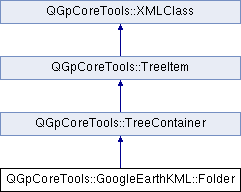
Brief description of class still missing. More...
#include <GoogleEarthKML.h>

Public Member Functions | |
| void | addPlacemark (Placemark *p) |
| void | clearPlacemarks () |
| void | collectPoints (QList< NamedPoint > &list) const |
| Folder (Folder *parent=0) | |
| const QString & | name () const |
| void | setName (const QString &n) |
| virtual const QString & | xml_tagName () const |
| ~Folder () | |
Static Public Attributes | |
| static const QString | xmlFolderTag = "Folder" |
Protected Member Functions | |
| virtual XMLMember | xml_member (XML_MEMBER_ARGS) |
| virtual bool | xml_setProperty (XML_SETPROPERTY_ARGS) |
| virtual void | xml_writeChildren (XML_WRITECHILDREN_ARGS) const |
| virtual void | xml_writeProperties (XML_WRITEPROPERTIES_ARGS) const |
Brief description of class still missing.
Full description of class still missing
| QGpCoreTools::GoogleEarthKML::Folder::Folder | ( | Folder * | parent = 0 | ) | [inline] |
: TreeContainer(parent) {}
| void QGpCoreTools::GoogleEarthKML::Folder::addPlacemark | ( | Placemark * | p | ) | [inline] |
Referenced by CoordReader::parse(), and QGpGuiTools::CoordinateFile::write().
{_placemarks.append(p);}
| void QGpCoreTools::GoogleEarthKML::Folder::collectPoints | ( | QList< NamedPoint > & | list | ) | const |
References collectPoints(), and TRACE.
Referenced by collectPoints().
{
TRACE;
for(const_iterator it=begin(); it!=end(); ++it) {
static_cast<Folder *>(*it)->collectPoints(list);
}
for(QList<Placemark *>::const_iterator it=_placemarks.begin(); it!=_placemarks.end(); ++it) {
list.append(NamedPoint((*it)->name(), (*it)->coordinates()));
}
}
| const QString& QGpCoreTools::GoogleEarthKML::Folder::name | ( | ) | const [inline] |
{return _name;}
| void QGpCoreTools::GoogleEarthKML::Folder::setName | ( | const QString & | n | ) | [inline] |
Referenced by CoordReader::setOptions(), and QGpGuiTools::CoordinateFile::write().
{_name=n;}
| XMLMember QGpCoreTools::GoogleEarthKML::Folder::xml_member | ( | XML_MEMBER_ARGS | ) | [protected, virtual] |
Re-implement this function to offer XML restore (children and properties) support to your class.
From tag and map (with contains the attibute value) return a unique identifier under the format of a XMLMember. XMLMember is initialized with 3 types of contructors:
Map of attributes can be inspected in this way (can be achived also in xml_setProperty()):
static const QString tmp("childrenName"); XMLRestoreAttributeIterator it=map.find(tmp); if(it!=map.end()) { // found attribute "childrenName" }
If the map of attributes is not used:
Q_UNUSED(attributes);
if(tag=="x1") return XMLMember(0);
else if(tag=="y1") return XMLMember(1);
else if(tag=="x2") return XMLMember(2);
else if(tag=="y2") return XMLMember(3);
else return XMLMember(XMLMember::Unknown);
Arithmetic operations + and - apply to XMLMember to avoid confusion of property id numbers between inherited objects. Offset 3 corresponds to the number of properties defined in this object.
if(tag=="anInteger") return XMLMember(0); else if(tag=="aString") return XMLMember(1); else if(tag=="aDouble") return XMLMember(2); return AbstractLine::xml_member(tag, attributes, context)+3;
For the arguments of this function use Macro XML_MEMBER_ARGS.
Reimplemented from QGpCoreTools::XMLClass.
References QGpCoreTools::XMLMember::Skip, TRACE, and QGpCoreTools::XMLMember::Unknown.
{
TRACE;
Q_UNUSED(attributes);
Q_UNUSED(context);
if(tag=="name") return XMLMember(0);
else if(tag=="Folder") {
return XMLMember(new Folder(this));
} else if(tag=="Placemark") {
Placemark * p=new Placemark;
_placemarks.append(p);
return XMLMember(p);
} else if(tag=="open") return XMLMember(XMLMember::Skip);
else return XMLMember(XMLMember::Unknown);
}
| bool QGpCoreTools::GoogleEarthKML::Folder::xml_setProperty | ( | XML_SETPROPERTY_ARGS | ) | [protected, virtual] |
Re-implement this function to offer XML restore properties support to your class.
From memberID set the corresponding property with value content. The map of attributes is given as a supplementary information (not useful in all cases).
For a general case:
Q_UNUSED(attributes); double val=content.toDouble(); switch (memberID) { case 0: _x1=val; return true; case 1: _y1=val; return true; case 2: _x2=val; return true; case 3: _y2=val; return true; default: return false; }
For classes inheriting other classes (see also xml_member())
switch (memberID) { case 0: _anInteger=content.toString(); return true; case 1: _aString=content.toInt(); return true; case 2: _aDouble=content.toDouble(); return true; default: return AbstractLine::xml_setProperty(memberID-3, map, content);
For the arguments of this function use Macro XML_SETPROPERTY_ARGS.
Reimplemented from QGpCoreTools::XMLClass.
References TRACE.
{
TRACE;
Q_UNUSED(attributes);
Q_UNUSED(context);
Q_UNUSED(tag);
switch (memberID) {
case 0:
_name=content.toString();
return true;
default:
return false;
}
}
| virtual const QString& QGpCoreTools::GoogleEarthKML::Folder::xml_tagName | ( | ) | const [inline, virtual] |
Reimplemented from QGpCoreTools::TreeItem.
{return xmlFolderTag;}
| void QGpCoreTools::GoogleEarthKML::Folder::xml_writeChildren | ( | XML_WRITECHILDREN_ARGS | ) | const [protected, virtual] |
Saves all children to an XML structure.
Reimplemented from QGpCoreTools::TreeContainer.
References TRACE, and QGpCoreTools::GoogleEarthKML::xml_writeChildren().
{
TRACE;
for(QList<Placemark *>::const_iterator it=_placemarks.begin(); it!=_placemarks.end(); ++it) {
(*it)->xml_save(s, context);
}
TreeContainer::xml_writeChildren(s, context);
}
| void QGpCoreTools::GoogleEarthKML::Folder::xml_writeProperties | ( | XML_WRITEPROPERTIES_ARGS | ) | const [protected, virtual] |
Reimplemented from QGpCoreTools::XMLClass.
References TRACE, and QGpCoreTools::XMLClass::writeProperty().
{
TRACE;
Q_UNUSED(context);
writeProperty(s, "name", _name);
}
const QString QGpCoreTools::GoogleEarthKML::Folder::xmlFolderTag = "Folder" [static] |